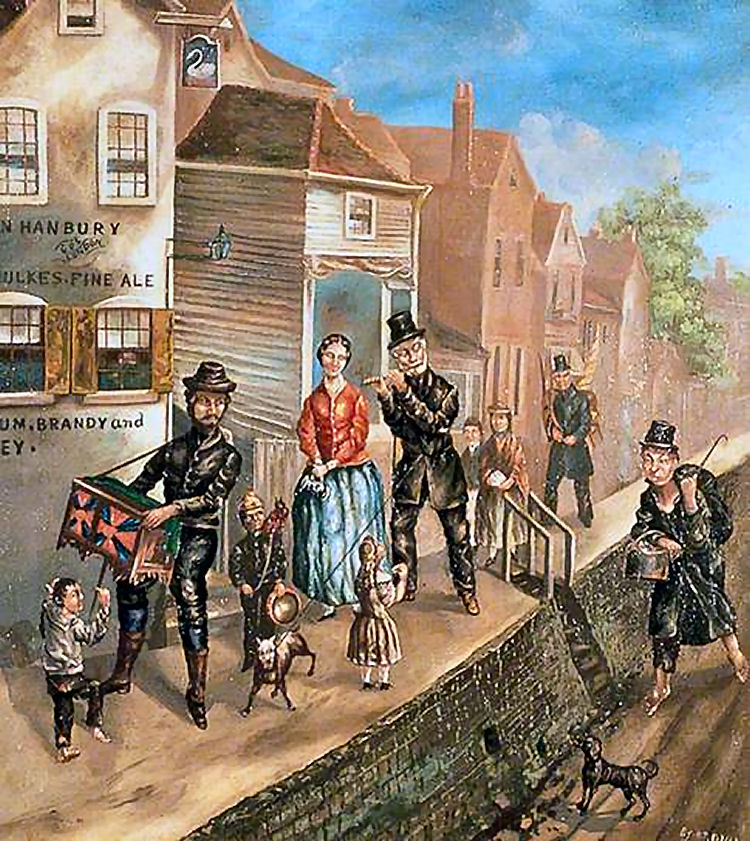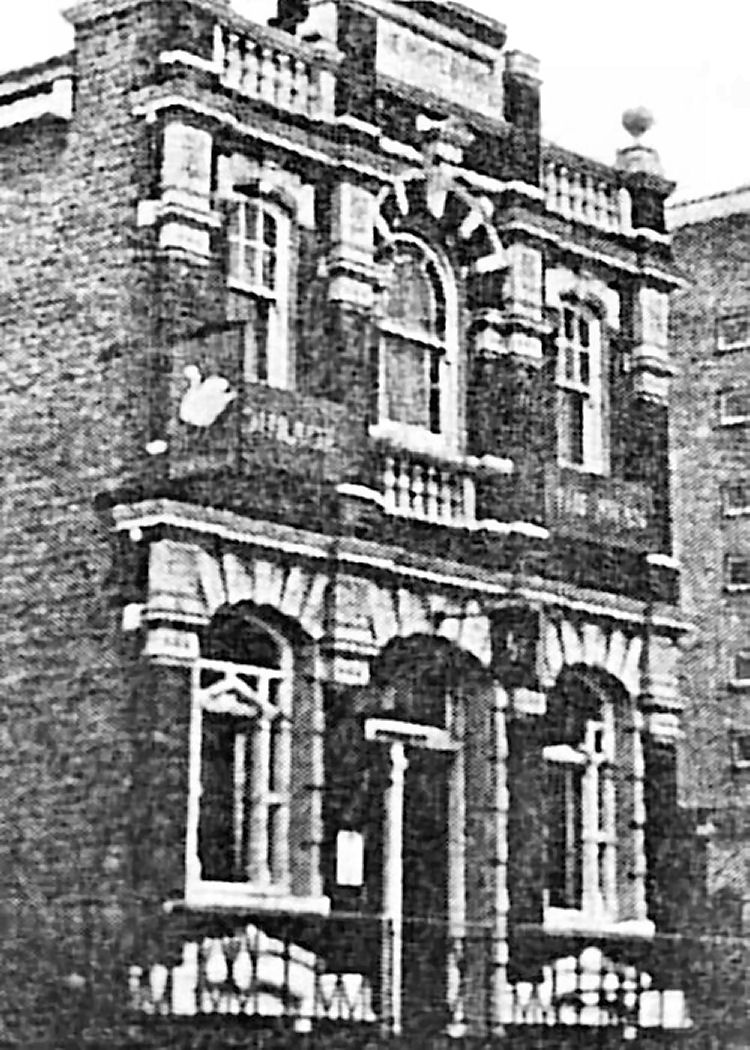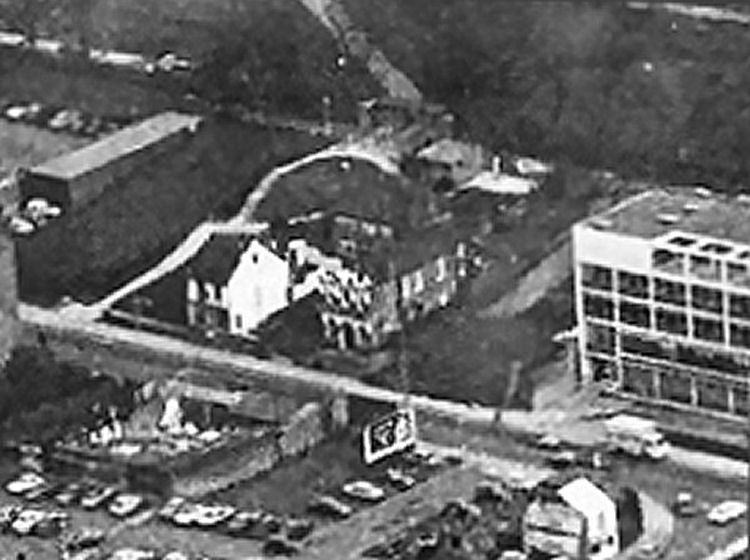|
From the Maidstone Telegraph, Rochester and Chatham Gazette, 3 August 1861.
Concealment of Childbirth that Chatham.
Robert Barrow and Amelia Barrow his wife, were severely indicted for the
wilful murder of an infant female child, at Chatham. Mr. Russell
appeared for the prosecution, and Mr. Ripton for the prisoners.
Mr. Smith, in an able address, having opened the case for the
prosecution, observing that the case the jury had to inquire into was
one of the most serious character, - the charge against the prisoners
was that of being concerned in the death of an infant child.
Alfred King, 10 years of age, residing at Brompton, said that he was
with two other boys by the wall of Chatham dockyard at about 2 o'clock
on the afternoon of July, picking up snails for his blackbird. He saw
some blood on the pathway, with two stones lying at about 20 yards from
the pathway in some nettles, and the body of a little child. The child
was quite dead.
Joseph Philman, a marine, gave similar evidence to the last witness. He
went up once for a policeman. The policeman carried the child away to
the "Swan Inn." There was blood on the child's face and neck.
John Charles Saxton, baker and confectioner, High Street, Brompton,
said:- The female prisoner was in my service. She slept out of my house,
at her father's. On 29th June prisoner asked for leave of absence for
the following day to go to London. She did not return on Monday. Her
mother came and did her work. I had noticed the prisoner was pregnant
about 2 months before her leaving.
Elizabeth Holloway, said that on Sunday evening 30th June, at twelve
minutes past nine, she saw the female prisoner walking from the Marine
barracks towards the dockyard gates, she saw the prisoner walking with a
sapper, and going in the direction of Brompton. The sapper was dressed
in forage cap and tunic. The female prisoner appeared very ill and
unable to walk. Witness passed them about midway between the barracks
and the dockyard gates. The females prisoner had hold of the soldier's
arm.
By Mr. Addison:- A great many persons pass that way.
By Mr. Smith:- The direction in which the prisoner and sapper will going
would lead them to the field where the child was found.
By the Judge:- It was about 10 minutes' walk to the spot where the child
was found from where I saw the prisoners.
Rose Frances lodged at the "Swan Inn" on the 30th of June last:- On
looking out of the window between 9 and 10 o'clock she saw a sapper and
a girl crossing the road. The girl, who seemed in great distress, had on
a light cotton dress, and was begging of the man not to leave her. The
man replied that it was nearly time he was in barracks. They then went
towards the steps leading to the dockyard field. She saw no more of
them.
Charles Fulcher saw blood near the pathway and two stones lying on it on
the morning of the 1st July. Had seen the woman about 10 the previous
evening lying with her face on the grounds near the place where he saw
the blood. The only person he met was a man in plain clothes about 200
yards from where the woman was lying.
Mr. Weeks, surgeon, deposed that on the 1st July he saw the child lying
in some nettles on the bank; it was quite dead. It was a female child
and full-grown. Made a post mortem examination and found scratches
around the neck, and there were also punctured wounds on the head and
body, with bruises around each, which appeared as if caused by stones.
The mouth was empty, but he found a piece of grass in the throat, which
proved that the child must have breathed. Was sent for by Superintendent
Everist to the house of the female prisoner, whom he found in bed. She
has recently been delivered of a child, which, in his opinion, was born
alive. Saw a light dress, the bottom part of which appeared to have been
washed at a different time from the upper. Saw blood on the soles of the
female prisoners shoes. On his examination before the magistrates, he
was shown a pair of trousers and shirt, on which were spots of blood.
By Mr. Biron:- The appearance of the child was not consistent with
premature or unassisted birth.
By the Judge:- The skull was not injured in any of the parts where the
wounds were.
Superintendent Everist deposed to going to prisoner's house on the 3rd
June, between 8 and 9 o'clock. Saw the male prisoner coming out. Found
the female prisoner in bed, and told her a child had been found, killed,
by the dock wall, and told her he wished to question her, but she might
do as she pleased about answering. She denied having recently given
birth to a child. Witness told her he should send for a surgeon.
Prisoner's mother said that her daughter had been prematurely delivered
of a child the Sunday previous, and that it was a miscarriage. Prisoner
said she had been married to the male prisoner the previous Sunday.
Found articles of female under-clothing covered with blood. He took her
into custody and then went to the Sapper barracks, and told prisoner
that from information he received he thought it his duty to take him
into custody. The prisoner replied that he was married to the woman on
Sunday, and on coming home from a walk she was taken ill, and that was
all he knew about it.
Police-constable Jobling gave corroborative evidence as to the finding
of the articles of dress, and also produced the tunic and shirt of the
male prisoner on which were marks of blood. When witness pointed out to
witness the marks of blood on the sleeve of the shirt he made no remark.
Colour sergeant Campbell said that the prisoner belong to his company,
and had a pass till 11 o'clock on the Sunday evening in question.
Caroline Ely deposed to lodging in the prisoner's father's house, and to
hearing the prisoners come home about 11 o'clock on the Sunday night in
question, and heard the male prisoner say goodnight.
Catherine Shonk, wife of Stephen Shonk, who resides at the Chatham
lock-up deposed to the prisoner having been brought to the lock-up on
Friday the 5th of July. She stated to witness that on Sunday evening she
went for a walk with a male prisoner to Luton. They went to the tea
gardens there, and had two or three pots of ale. When they returned home
they came out of the "Star," at the top of Chatham Hill. They got home
about 11, and the prisoner stayed with her a few minutes and then bid
her good night.
Corporal McCoy, who had charge of the Brompton barrack gate on the night
of the 30th of June, deposed to receiving the prisoners pass at the gate
at about 11 o'clock.
This being the whole of the evidence.
Mr. Addison then briefly, but ably addressed the jury for the male
prisoner, urging that it was inconceivable that on the same day the
prisoners were married they should have concocted such a cold blooded
murder, and that without any apparent object. It was not remarkable that
the prisoner should be seen with his wife on her marriage day, but he
submitted that there was nothing to connect him with the woman who was
seen lying on her face in the field where the child was found, nor was
there anything whatever in the evidence to connecting with a death of
the child.
Mr. Biron then address the jury for the female prisoner, complaining
that the medical testimony was of a very unsatisfactory nature, and he
did not believe the jury would think it sufficient to justify them in
convicting the prisoner.
His Lordship summed up at considerable length, remarking that the points
for the jury to consider were, whether the child had had separate
existence, whether the child found was the child of the female prisoner,
and whether the male prisoner was in any way connected with it's death.
The jury then retired to consider their verdict, and after an absence of
40 minutes, acquitted both prisoners of murder, but found the female
prisoner Guilty of Concealment of Birth, and she was sentenced to 3
months' imprisonment.
|


